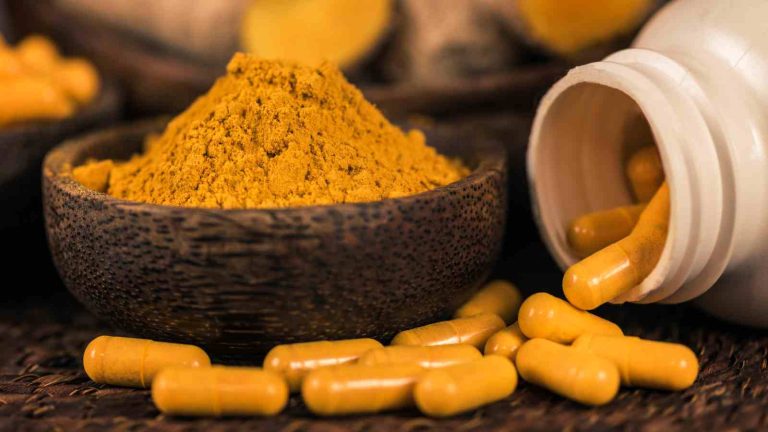
Turmeric or haldi is a common ingredient in desi kitchens. After all, it has anti-inflammatory and antioxidant properties, and gives a nice intense yellow colour to dishes. But the Australian government’s departments of Health and Aged Care and Therapeutic Goods Administration recently issued a joint advisory on turmeric supplements. As per the advisory, herbal supplements and medicines with turmeric and/or curcumin may cause liver injury in rare instances. In the past also, similar link between liver injury and turmeric supplements were found. As per a 2021 study published in the US National Library of Medicine, more than a dozen cases of liver injuries related to turmeric products were reported. So, should you avoid turmeric for liver health?
Points to keep in mind before taking turmeric supplements
The latest advisory and past findings reflect the importance of monitoring and being cautious about the use of herbal supplements, including turmeric and curcumin.

Before taking turmeric supplements, consider the following points:
1. Individual variability
People’s responses to supplements can vary greatly. While many people may benefit from turmeric supplements without experiencing adverse effects, others might be more susceptible to complications, including liver injury, says Ekta Singhwal, Dietician, Ujala Cygnus Group of Hospitals, Moradabad, Uttar Pradesh.
2. Dosage and quality
Some turmeric supplements might contain varying levels of active ingredients or contaminants that could potentially contribute to adverse effects. Dosages can vary widely among different supplements, and there isn’t a universally recommended dosage for everyone. Typical doses of curcumin supplements range from 500 to 2,000 mg per day, says the expert. But remember that higher doses don’t necessarily equate to better results, and the appropriate dosage depends on individual factors such as health status, existing conditions and potential interactions with other medications. Quality is also important, as the potency of curcumin supplements can vary based on factors like formulation, manufacturing processes and source. Choosing supplements from reputable brands that undergo third-party testing for quality and purity is advisable.
3. Underlying health conditions
People with pre-existing liver conditions or other health issues may be more vulnerable to potential side effects from turmeric supplements.
4. Interaction with medications
Turmeric and curcumin might interact with certain medications like blood thinners, antidiabetic drugs and antacids potentially affecting their efficacy or causing adverse reactions.
5. Consult healthcare professionals
People considering the use of turmeric supplements, should consult their healthcare providers before starting a new regimen. They will be able to assess individual health status, potential interactions and offer personalised recommendations.
Is raw turmeric healthy?
Turmeric supplements can be more convenient for those who might not take turmeric in their diet. But turmeric in raw form is believed to offer several potential health benefits. These include improving digestive health and supporting joint health. All you need to do is keep an eye on portion. Here’s why turmeric in meals works well:
1. Whole food benefits
When you have turmeric as part of whole foods, such as in cooking or as a beverage like turmeric water, you get a combination of compounds that work synergistically, says the expert. Turmeric contains various bioactive compounds, including curcumin, but also other potentially beneficial components that may contribute to its overall health effects.

2. Bioavailability
Curcumin, which is the active compound in haldi, happens to have low bioavailability. That means it gets easily absorbed by our body. Consuming turmeric along with fats or black pepper (which contains piperine) can enhance curcumin absorption. Traditional Indian cooking often incorporates these factors, which can improve the body’s utilisation of curcumin.
3. Balanced nutrient intake
Incorporating turmeric into a balanced diet ensures that you’re benefiting from its potential health effects within the context of a broader range of nutrients. This is often lacking when taking isolated turmeric supplements.
4. Minimised risk of overconsumption
When you consume turmeric as part of whole foods, it is less likely that you will consume excessive amounts. High-dose of supplements might have potential risks, especially in terms of interactions with medications or the possibility of adverse effects.
Safe ways to consume turmeric
Turmeric is generally considered safe when consumed as a spice in food, excessive consumption of turmeric supplements could potentially impact the liver, says the expert. In rare cases, high doses may lead to liver issues. This is why it’s important to use turmeric in moderation. Here are some safe ways to include turmeric in your diet:
1. Cooking
Using turmeric as a spice in cooking is a traditional and safe way to enjoy its flavour and potential benefits. It’s commonly used in curries, soups, stews and rice dishes.
2. Turmeric milk
This is a popular beverage made by mixing turmeric with milk along with other spices like black pepper, ginger, and cinnamon.
3. Turmeric tea
Similar to haldi milk, turmeric tea involves steeping turmeric in hot water. You can add some lemon, honey or other spices for flavour.
4. Smoothies
Adding a small amount of turmeric to smoothies can give you a nutritional boost.
5. Salad dressings
If you are watching your weight and eating salad, you can incorporate turmeric into salad dressings.
All you need to remember is not to go overboard with haldi.